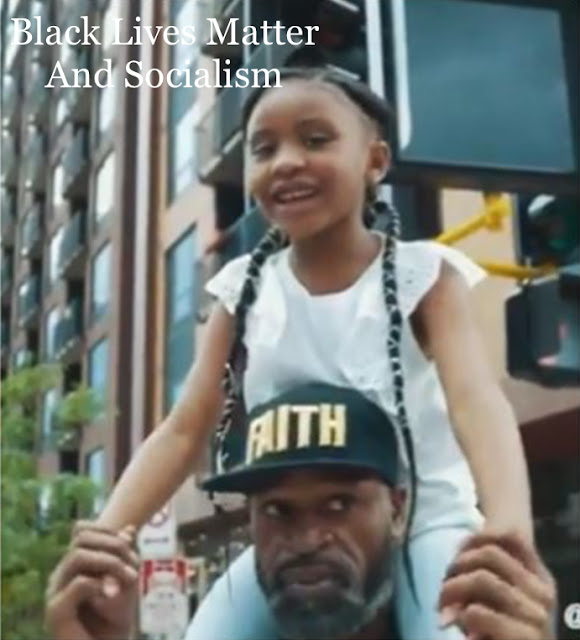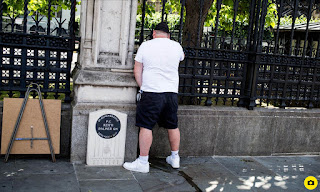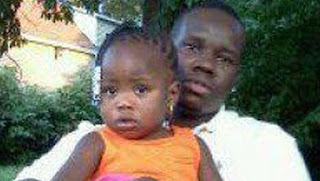The murder of George Floyd by a Minneapolis police officer has sparked a huge global protest. But, his murder was symbolic not because it was an unusual display of police brutality but rather because it summed up in extreme form the daily lives of so many black and minority ethnic citizens in countries throughout the World. The fact that the murder was captured on video made any denial entirely implausible. Yet, on Sky News this week a member of the white British commentariat, discussing the Black Lives Matter protests in London, claimed that the police were being prevented from doing their jobs by an over-sensitivity to accusations of police brutality. Anti-racism protestors are described as "thugs" by the American President, as "law breakers" by the British Home Secretary (herself Asian), and as "unreasonable "by the Leader of the British opposition party. All of them miss the point. A point missing exercise supported by the main news outlets in the UK whose focus on the protest was almost entirely from a public order perspective and whose commentary was dominated by policing specialists and white journalists and academics.
For a short time the media was sympathetic to the protesters. But, this was on condition that they behaved "responsibly", had their march and then returned home satisfied that they had made their point. Without violence most of the media would have given little coverage to the demos taking place and would quickly have moved on. But whilst the media are attracted to violence like a baying mob, they can also feign indignation and moral repugnance. Sky News coverage was almost exclusively from behind police lines and the reporter kept reminding viewers that the message of the protests (which I noticed he did not keep repeating) would be lost. The violence was the actions of a minority who had turned up intent on causing trouble. The police, we were told, had sympathy with the protesters but had no choice but to respond to this irresponsible minority. And, the evidence as if the constant commentary was not enough was a police horse so terrified of the protesters that it bolted causing its rider to hit a traffic light and be knocked to the ground.
I have been on numerous demonstrations across the years and on most occasions they are good natured without any hint of violence. Perhaps the small minority of trouble makers stayed away from those events. Where there has been trouble it has invariably been caused by over- aggressive policing. Often, the police cordon off areas to prevent protesters from going near them. The inevitable consequence of which is to create a confrontation with people who think they have a right to walk down public streets and a right to demonstrate. I have been on a couple of demos where police horses are deployed. It's terrifying. I am over six foot and they tower over me. The only viable option for protesters is to get out of their way. They are extremely well trained and used to being surrounded by crowds. If a horse was terrified, and if their rider lost control it is highly unlikely that the crowd could have caused it. Either the horse was inadequately trained or the rider was, but either way that is the responsibility of the police not the protesters.
To see genuine anti-police violence it was only necessary to await the arrival of the “patriots” who, egged on by Boris Johnson, turned up to “protect” Winston Churchill’s statue. This they did by getting drunk, urinating on a monument to PC Keith Palmer, giving Nazi salutes, terrorising people having a picnic, racially abusing any passing black person and fighting with the police. That even the Daily Mail condemned them is all the evidence needed of how odious they were.
But that the attitudes they espoused were straight from many a Mail front page or editorial went without comment as the media sought to create an equivalence between a bunch of racist thugs and anti-racist protesters.
But that the attitudes they espoused were straight from many a Mail front page or editorial went without comment as the media sought to create an equivalence between a bunch of racist thugs and anti-racist protesters.
But, I am falling into the trap the media have set. Instead of talking about why the protests occurred, I am dwelling on the public order implications. When protesters are peaceful they tend to be ignored, when there is violence they are condemned. The fact is the establishment permits demos but they do not want them to become too popular. Even the biggest demos (the anti-Iraq war London demo, for example) attract only a minority of the population. The majority do not engage with politics and until their lives are substantially affected do not demonstrate. Which brings us back to George Floyd.
George Floyd's life was cut tragically short at 46. He was a 6' 4" basketball playing, part-time rapper who had worked as a bouncer and truck driver. He had a criminal record for armed robbery in 2009 but was otherwise just an ordinary citizen struggling to get by. It is not known precisely how many people die in police custody in the USA each year but a 2016 study found 222 deaths in 2013 alone. The study published in the New England Journal of Medicine found that black males aged 20- 54 were the most likely victims. As CNN reported in 2018:
“Few police officers ever face trial for shooting deaths, let alone are convicted.”
Sadly, George Floyd's name will be added to the pantheon of deaths by lethal force carried out by American police officers. CNN give us some names of other young black lives which clearly did not matter. They include Lamar Anthony Smith (Pictured) who was shot 5 times in the back by white St Louis police officer Joseph Stockton, who was acquitted after the white judge Timothy Wilson ruled that it was self-defence. Or, there is 40 year old Terence Crutcher who was shot whilst reaching for his identification in 2016 by white Tulsa police officer Betty Shelby who was cleared of murder by a majority-white jury. But these cases, as dramatic and tragic as they are, still miss the point.
Murder grabs our attention because it is clearly and obviously an injustice. But the underlying issue, and a reason why white killers go free, is that the wider society so often blames the victim. Those accused of crimes, no matter how heinous, must have a fair trial, but that should not include any form of defence that says the victim asked for it. Nobody asks to be murdered.
Black people are disproportionately victims because of institutionalised racist attitudes and social structures. We convince ourselves that these things are changing, that we are becoming more liberal, that society is becoming more equal only if we are not daily confronted by the reality of racism and sexism. It is a privilege to be white, male or middle/upper class not because white middle class men ask for their privilege but because we take it for granted.
And yet if we look at the demographic of the white drunken thugs terrorising innocent picnickers they are predominantly white and male, admittedly not middle or upper class. And, perhaps that is where class becomes an issue. For one Saturday afternoon in London it was as if all the scum in the Thames had risen to the surface and spilt on to the streets of Whitehall. This was not a “counter demonstration”, the Black Lives Matters organisers had wisely chosen to avoid the confrontation, though that confrontation will surely come as the right-wing thugs become bolder (and drunker), and the very real issues underlying the BLM protests are sidelined by organised thuggery allowing the rights propaganda sheets to feign moral outrage at their own supporters.
Here I am falling into the trap. What I want to discuss is institutionalised racism and the way it is hardwired into a social system – capitalism – that was built on the blood, sweat, tears and brutal exploitation of African slave Labour. As Marx noted capitalism came into being dripping in blood. He was not wrong. The monuments to early slave trading and slave owning entrepreneurs were not monuments erected by a grateful community who wanted to honour their generosity, but monuments bought and paid for by fellow slave traders and owners. Edward Colston, dumped into the harbour in Bristol was a notorious slave trader whose company, Royal African Company, branded men, women and children across their chests. His monument was not, as seems to be widely accepted, erected by the people of Bristol but paid for entirely by his friend James Arrowsmith. The Royal African Company is known to have kidnapped over 200,000 men, women and children who were taken to English colonies and sold as slave labour. It is estimated that some 44,000 died en route.
For those who want to glorify in white supremacy this is the historical precedent that they seek to validate. The attitudes of racism were a necessary part of the slave trade. It could only exist if black people were naturally inferior to whites and thus existed for the sole benefit of white people. Systematic exploitation was the financial building block for modern capitalism, and racism was, and still is, its ideological justification.
For sure, since the sixties and seventies we have seen advances for people who were not lucky enough to be born with a white skin. There is now a substantial black middle class. And yet black people are more likely than whites to live in poverty, to be arrested, to go to jail, to die from Covid 19, and less likely to go to university, or to become judges, journalists or MPs. In fact, the statistics are clear that despite whatever advances have been made the UK (and USA) remains structured by racial prejudice and discrimination.
None of this is to suppose that there are not white people who live in poverty, get fitted up by the police, or have as much chance of becoming a judge or MP as I have of breaking the Olympic 1500 metres world record. Capitalism does not, and cannot, create a society of equals. But, white people can, on the whole, expect to walk down the street without some random group of thugs setting on them because they do not like the colour of their skin. White people are not prevented from rising the career ladder merely because they are white. That is, however, the daily lived reality of so many black people. Despite the fact that black people can make it, they have to work so much harder than white people to do so.
Exploitation is a key feature of a capitalist economy. But, there is no intrinsic reason why skin colour should single out a particular group to be more exploited than any other. As Marx noted in Capital and elsewhere, capitalist exploitation required a class of exploiters and a class to be exploited. The class of exploiters could just as easily have been black. Liberalism which accompanied capitalism and provided the political and moral cover for the pursuit of profit by any means was developed exclusively by white men who whilst keen on liberty, equality and fraternity for themselves, were always less keen on bestowing it on others. This meant that from its inception capitalism had a view of white, male supremacy as a key part of its dominant ideology. Black people provided the free labour that brought capitalism into being. But, when black slaves were freed and thrown into the labour market to sell their labour power, they came into direct conflict with white workers who, very often, considered themselves superior to the ex-slaves purely because of their skin colour.
It took time for the white working class to find common cause with the black working class. In the 1960's trade unions played a key role in excluding black workers from certain industries. Racist attitudes were commonplace, and reflected in the popular culture of the 60s, 70's and 80s. Every attempt by anti-racists to push back against the systemic prejudice has been met with outrage from a dominant white majority who despite professing to care little about the colour of a person's skin draw the line when told that a comedy icon such as John Cleese has been guilty of racism in the past. So, whilst racism is endemic in the structures of liberal capitalism it is embedded in the culture which most white people do not critique because to us it simply does not offend.
Of course, many white people are anti-racists. The Black Lives Matter protests, whilst predominantly black, have the support of many white people. But the lived experience of blacks and whites is different. Until we acknowledge that simple fact we will simply repeat what has happened before. Of course things have improved. We now have a black middle class, black Tories and black entrepreneurs who exploit both black and white workers. None of this, however, mitigates the reality of lives lived in fear of a racist attack or lives left unfulfilled because of a persons skin colour.
I have seen social media posts claiming that BLM or taking the knee are merely "identity politics" or symbolic acts and therefore the left should not become obsessed with them. The argument is that these protests take us no closer to socialist revolution. This attitude seems to me to miss the point of both socialism and revolution. They are also, in my
view, inherently racist. To be a socialist is not to be a dogmatist who follows a carefully worked out "line; but rather it is to seek to create a better World. To ignore the suffering of a group of people because lifting a finger (or taking a knee) to support them will not bring socialism is an abandonment of socialism. Socialists have always stood with the oppressed. And, have always supported the movements of oppressed peoples wherever they occur.
But, is BLM revolutionary enough?
Some on the left act as if there is a blueprint for revolutionary change and any deviation from the blueprint is therefore a waste of time or an example of "false consciousness " . The fact is there is no blueprint. Revolutions occur when a class of people make demands upon another class of people that the ruling class cannot deliver. BLM is not a movement that has revolution at its core, but it has a very reasonable (and potentially revolutionary) demand: treat us like human beings. Act as if our lives matter as much as yours. BLM, like the environment protests, is a globalised protest with no discernible leadership. It is possible, though unlikely, that global capitalism will absorb the demands that black people should be treated the same as white people. As a result the ingrained racist attitudes will fade away and die. As Emily Tamkin wrote in last week's New Statesman the protests have already succeeded in bringing about changes that have been demanded for a long while:
“These protests, and the response of the police, have shown to the whole of the US that black Americans have been telling the truth about police brutality. It should not have taken this, and should not have taken so long, but it’s finally happened. That is the historic achievement of these protests.”
If we want a socialist critique of BLM it is that too many black people aspire only to an equality that leaves far too many white people also in poverty. But , if you feel that you are at the bottom of the pile, isn't it inevitable that the middle of the pile seems more attainable than the top? And, even if the pile is corrupt at its core isn't it inevitable that abolishing the pile entirely may seem a risky move? White socialists do not have the right to lecture black people on their oppression. We do have the right to continue our critique of capitalism, but we cannot demand that a movement for reform is only worth supporting if it abandons reform for revolution. Most white people are not socialist revolutionaries either. For now, in my view, BLM is a movement that might be derailed by a few minor reforms or ignite a social movement that brings long-lasting social change. If the former, who am I to deny my fellow citizens that which I take for granted? If the latter, perhaps we are on the verge of significant change. As a socialist I want to be part of that change, not sitting on the sidelines glorifying in my own purity.








No comments:
Post a Comment
Many thanks for reading this post and for commenting.